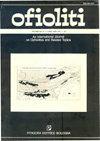Lithostratigraphy and petrography of the Monte Banchetta-Punta Rognosa oceanic succession (Troncea and Chisonetto Valleys, Western Alps)
IF 1.3
4区 地球科学
Q2 GEOLOGY
引用次数: 5
Abstract
This paper describes lithostratigraphy and Alpine tectono-metamorphic evolution of the oceanic succession of the Monte Banchetta-Punta Rognosa unit (Italian Western Alps). The oceanic substratum consists of serpentinized peridotites covered by ophicarbonates, documenting therefore exhumation and exposure of the upper mantle at the seafloor in Jurassic times. Upwards, the sedimentary cover begins with polymictic metabreccias and intercalated siliciclastic sediments (considered Late Jurassic - Early Cretaceous in age), both containing oceanic and continental detritus, and interpreted as mass-flow deposits on sea floor. Then, the upper part of the cover consists of Cretaceous pelagic carbonate sediments (calcschists), lying over a main unconformity. The stratigraphic features and the architecture of the sedimentary cover suggest that this segment of the Piemonte-Liguria Ocean was in a proximal position with respect to the rifted margins. In a general context of the ocean-continent transition, source areas for continental detritus can be envisaged on the hyperextended part of the European margin or on its more proximal part, adjacent to structural highs made of oceanic mantle, as recorded by oceanic detritus. The combination of structural, petrographic and mineral chemistry data defined the Alpine prograde and retrograde metamorphic evolution of this oceanic segment. The metamorphic peak was reached during the D1 event at the transition between lawsonite- and epidote- blueschist facies conditions. Then, a first decompressional event D2 always at blueschist facies conditions was followed by a D3 event at green schist facies conditions.Monte Banchetta Punta Rognosa海洋序列的岩石地层学和岩石学(西阿尔卑斯山的Troncea和Chisoneto山谷)
本文描述了意大利西阿尔卑斯山Monte Banchetta-Punta Rognosa单元海洋演替的岩石地层学和高山构造变质演化。海洋基底由蛇纹岩化橄榄岩组成,由蛇纹岩覆盖,因此记录了侏罗纪时期海底上地幔的发掘和暴露。向上,沉积盖层开始于多裂变质岩和夹层硅屑沉积物(年龄被认为是晚侏罗世-早白垩世),包含海洋和大陆碎屑,并被解释为海底的质量流沉积。盖层上部为白垩纪上层碳酸盐沉积(钙片岩),位于主不整合面之上。地层特征和沉积盖层构型表明,这段皮埃蒙特-利古里亚洋相对于裂陷边缘处于近端位置。在海洋-大陆过渡的一般背景下,可以设想大陆碎屑的来源区域位于欧洲边缘的超伸展部分或其更近的部分,毗邻由海洋碎屑所记录的由海洋地幔构成的构造高点。结合构造、岩相和矿物化学资料,确定了该洋段的高寒进、退变质演化。变质峰发生在D1事件期间,在褐煤-绿帘石-蓝片岩相条件过渡时期。然后,第一次减压事件D2总是在蓝片岩相条件下,随后是绿片岩相条件下的D3事件。
本文章由计算机程序翻译,如有差异,请以英文原文为准。
求助全文
约1分钟内获得全文
求助全文
来源期刊

Ofioliti
地学-地质学
CiteScore
2.40
自引率
7.70%
发文量
1
期刊介绍:
Since 1976, Ofioliti provides an international forum for original contributions and reviews in the field of the geodynamics, petrology, geochemistry, biostratigraphy, stratigraphy, tectonics and paleogeography applied to ophiolitic terrains and modern oceanic lithosphere, including their sedimentary cover. Studies of topics such as geodynamics of the mantle, the evolution of orogens including ophiolites and paleoceanography are also welcome
 求助内容:
求助内容: 应助结果提醒方式:
应助结果提醒方式:


